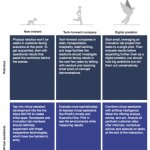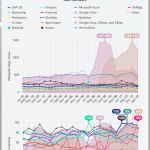AI M&A Gathers Momentum
AI M&A Gathers Momentum
by Mike Azzara, Op-Ed Contributor, February 16, 2017
Everyone who cares about artificial intelligence and machine learning in marketing is no doubt aware of the big players’ recent acquisitions. Seeing how Google and Facebook create magic via AI technologies, all the usual suspects are using M&A to catch up. Ultimately, marketers will find many companies competing to provide the magic.

In 2016, the biggest surge of AI-related M&A came from Salesforce.com, which bought about a half dozen little companies leading up to its Einstein AI-as-a-service platform announcement last fall.
But that’s not all: Apple bought a couple of predictive analytics companies in 2016. eBay grabbed one of those as well, along with an image recognition and recommendation optimization engine. Google picked up more image and natural-language recognition talent. IBM acquired personal shopping and fraud detection AIs. And Intel bought some technology for training deep learning neural networks, as well as image recognition AI tech that’s embeddable in chips. To name just a few.
The macro trend is a general surge in deals targeting AI technologies of all stripes. AI deals averaged roughly six per month in 2016, rising throughout the year from around three per month in the first quarter. And in January 2017, that average doubled.
Although none of the January deals announced prices, the biggest was likely Microsoft’s acquisition of Maluuba, a Montreal company doing deep learning for natural language processing that aims to help computers develop reasoning of their own. Microsoft’s AI ambitions, of course, transcend marketing.
In another notable January deal, Amazon Web Services picked up AI technology that detects cyber intrusions.
At this point, Microsoft, Amazon, Google and now Salesforce.com each offer an array of “AI-as-a-service” capabilities that include, but are not limited to, marketing functions (though Salesforce.com’s is still rather nascent compared to the others). These platforms will dramatically accelerate AI advancement and democratize its use.
A little closer to home, Comcast acquired native digital advertising platform Watchwith, which has developed machine learning technology that creates deep metadata for video — it can figure out what’s going on inside a movie or a sports event to help viewers navigate to exactly what they want to see.
Two quirky little January deals involved AI that aims to improve customer engagement via smartphone apps.
First, website publishing platform Wix.com acquired flok (formerly known as LoyalBlocks), maker of an AI-powered automated chatbot that was recently added to its customer loyalty app for small- and medium-sized businesses. This is one of those AI-for-the-masses technologies, which claims to be as easy for a marketer or business owner to set up as the drag-and-drop method of website building used by its new adoptive parent.
Once fully set up, location-aware flok engages customers in ongoing conversations, answering questions (so the business owners don’t have to) and deciding the right moments to offer rewards, incentives and reminders. It can do so across multiple channels, but is mobile-focused.
WalkMe, an engagement analytics company whose customers reportedly include the likes of MasterCard, PayPal, Pandora, Sony, IBM and Microsoft, acquired Abbi (a concatenation of A/B, as in the testing, and BI, as in business intelligence). If one of the grails of marketing is to deliver the right message to the right customer at the right moment, Abbi’s technology is about making that happen within mobile apps.
As TechCrunch put it: “Abbi uses a variety of machine learning and AI techniques to find those right moments. The company said that it collects some 300 session parameters per second and correlates those with the piece of content that it might show you (whether it’s an offer for a product, or a suggestion of an app you might like, or something within the app that might interest you), and it also uses those parameters and resulting big data lookalike profiling to develop a profile of your own “emotional sentiment” at a given moment. It also provides predictive analytics to give you an idea of how to target future audiences.”
One aspect of the flok and Abbi deals that I found interesting is that all four companies — both buyers and both sellers — emerged out of the AI start-up ghetto in and around Tel Aviv, but they mostly claim headquarters in New York or San Francisco.
I admit it, I’m an M&A junkie. I’ll keep passing along info like this unless you, gentle reader, tell me to stop in the comments below!
MediaPost.com: Search Marketing Daily
(61)












